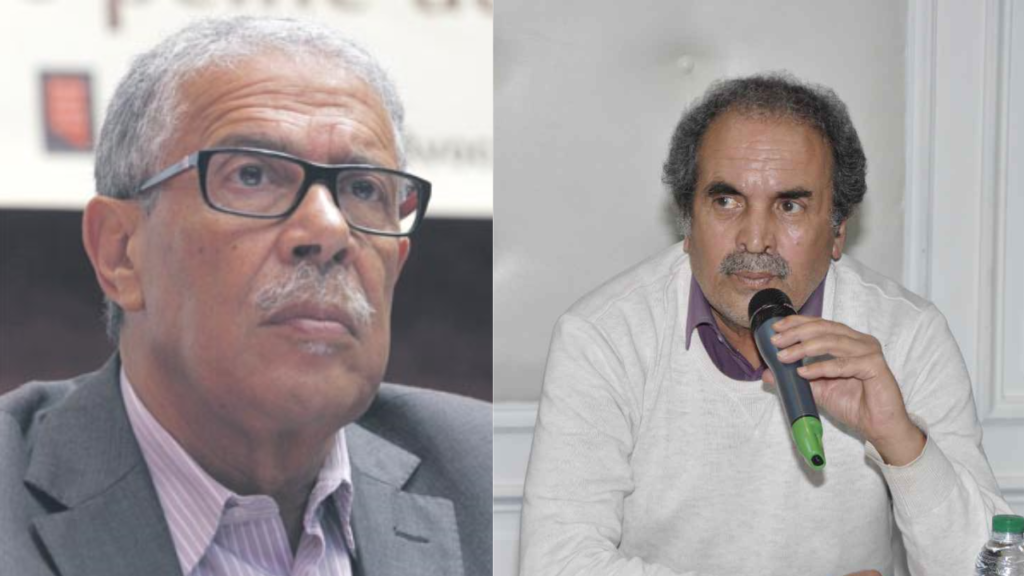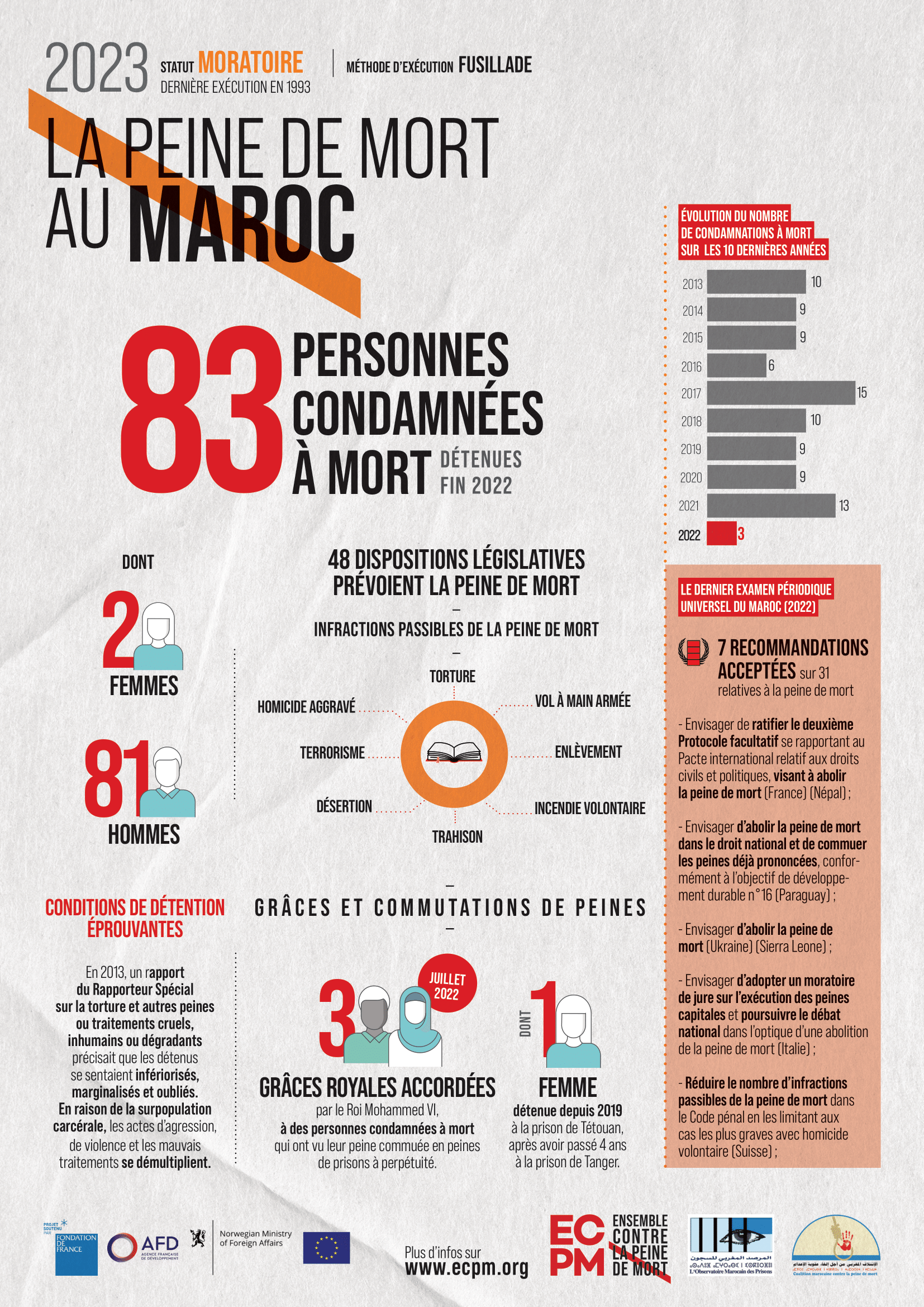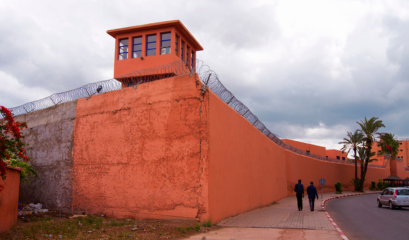
After 30 years of moratorium and a decrease in the number of death sentences, what can we hope for regarding the abolition of capital punishment in Morocco?
Mr. Jamai: Over the past two decades, progress has been made, largely due to political will, as evidenced by the absence of executions since 1993. Societal debate continues among different citizen and political sensitivities, particularly regarding calls for an advanced evolution of penal policy on the philosophy of punishment. Two highly anticipated bills for over a decade, those concerning the penal code and the code of criminal procedure, will shape the country’s future. We fervently hope for a significant decrease in the number of sentences pronounced. It is the hope, will, and determination of NGOs and all abolitionist actors that will prevail in the near future. Indeed, as the universal trend towards abolition confirms, in Morocco, abolitionists are gaining ground…
Mr. Mouseddad: We can only rejoice in the progress made in the struggle led by abolitionists within the human rights movement in Morocco. However, the fight for the abolition of the death penalty, both in practice and in law, must continue. This fight aims to shift the balance of power in favor of achieving several crucial objectives: the ratification of the Second Optional Protocol to the International Covenant on Civil and Political Rights, the ratification of the Rome Statute of the International Criminal Court, and the adoption of a penal code devoid of the death penalty.
These advances are essential to consolidate the achievements made and to advance the cause of the abolition of the death penalty in Morocco.
What are the different difficulties faced in the fight to abolish the death penalty in Morocco?
Mr. Jamai: The abolitionists’ struggle takes place in a context influenced by mentalities, political agendas, and the level of crime both nationally and internationally. The effectiveness of awareness and communication actions, and the means used to advocate for abolition by NGOs, political parties, and intellectuals, helps to shift positions.
Unfortunately, we observe within certain political parties a gap between the stated will to abolish the death penalty and concrete actions, particularly in agendas and programs. This situation gives the impression that abolitionists find themselves isolated and powerless, deprived of the support of political and democratic forces active in society.
Mr. Mouseddad: The challenges encountered in the fight for the abolition of the death penalty are of various natures :
- The political challenge, which is measured by analyzing the manifestations of political will among decision-makers and government institutions. Currently, the limited involvement of political parties in favor of abolition restricts the ability to influence policies and legislation.
- The sociocultural challenge fueled by the education system, the rate of illiteracy, and the influence of religious currents that may sometimes support the retention of the death penalty.
These complex obstacles require a strategic and multidimensional approach to overcome resistance and progress towards the abolition of the death penalty.
What are the key points/elements of the report in your opinion?
Mr. Jamai: This report comes at a crucial time as Morocco chairs the Human Rights Council in 2024 and the vote on the United Nations General Assembly resolution calling for a universal moratorium on the application of the death penalty is scheduled for December 2024. Furthermore, the debate on the reform of the Code of Criminal Procedure is expected to take place during the next parliamentary session.
Therefore, this report will be an essential tool supporting our advocacy and providing an overview of the favorable context for abolition in Morocco. It addresses the history of the death penalty in Morocco, the legal and judicial status of the penalty, the place of the right to life in penal policy, the behavior of justice actors (judges and lawyers), and their contribution to the fate of individuals threatened by the death penalty. Finally, the report recalls the work done and the proposals of abolitionist actors and NGOs to accompany Morocco towards the abolition of this penalty.
What can you tell us about the current state of detention conditions for death row prisoners in Moroccan prisons?
Mr. Jamai: Visits to death row prisoners continue by the OMP, the Coalition, and its partners. Overall, we observe that the situation is not deteriorating significantly, but it remains challenging, as is often the case in carceral environments. Death row prisoners face significant psychosocial difficulties.
The lack of family ties, insufficient organization of visits by lawyers and NGOs, and the lack of follow-up by specialists throughout incarceration are recurring problems. Additionally, the perpetual threat of execution exerts considerable pressure on individuals sentenced to death, even though its application in our context is almost unthinkable.
It is now time to rethink how death row prisoners are cared for. Should we consider creating specific open centers for them, or on the contrary integrate them with other prisoners so that they feel more part of society and remove the sense of dehumanization that leads them to consider themselves as dangerous and excluded individuals? Collective reflection involving all relevant stakeholders on these proposals is necessary to find appropriate responses to this complex situation.
Mr. Mouseddad: I would add that the current state of incarceration conditions for death row prisoners presents both similarities with the overall prison population and distinctive characteristics. Like all prisoners, death row prisoners face common challenges such as prison overcrowding and difficult living conditions. Detention conditions vary less according to the sentence than according to a new classification of prisoners, which is not transparent and is not enshrined in regulations. They are classified into several categories according to their degree of dangerousness, which would be linked to the nature of their crime and their behavior. This has implications for the detention conditions of individuals considered particularly dangerous, including those sentenced for acts of terrorism: they have limited access to rights, such as outdoor activities and rehabilitation activities; their housing conditions are more challenging, and increased isolation is imposed on them (no contact with other prisoners, restricted visiting modalities). Applying this classification to prisoners on death row, regardless of the length of their sentence, appears excessive, increasing feelings of isolation and psychological vulnerabilities that this group of prisoners particularly faces.


